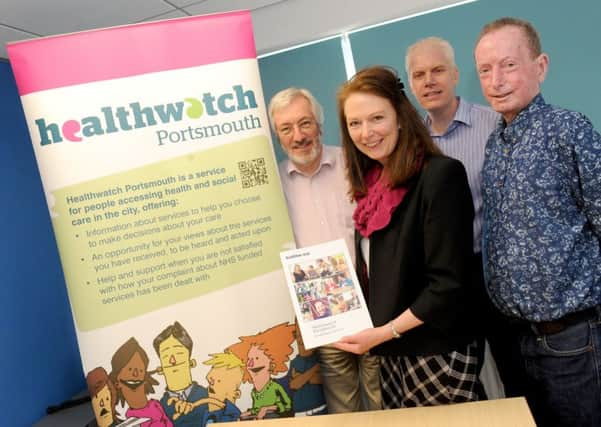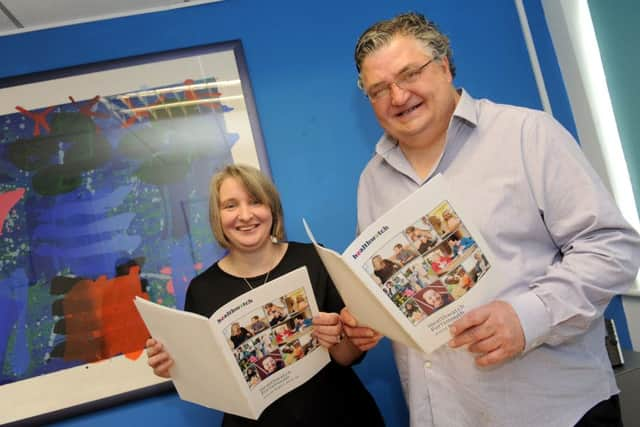'˜Healthwatch is all about giving the public a say'


To help get its name out there, the Portsmouth branch of the organisation has been attending events and promoting itself so it can help more people in the city.
Healthwatch Portsmouth has two key roles – ensuring the public gets to have their say on health services and advocacy.
Advertisement
Hide AdAdvertisement
Hide AdGraham Heaney, chairman of the city group, says: ‘We’re set up with certain responsibilities to ensure the public have the chance to have a say on the way health services are delivered.


‘We’re all about helping the public have their say.’
To do that, Healthwatch works on community engagement. That entails going out and talking to people and giving them the chance to give feedback on a service.
Sometimes, volunteers will have a stand on the high street or they will book a stall at popular city events.
Graham adds: ‘Not a lot of people have heard of Healthwatch or know exactly what we do.


Advertisement
Hide AdAdvertisement
Hide Ad‘By getting out there and attending events, we can do our job but also meet people and promote who we are.’
Volunteer Brenda Skinner has been helping out at Healthwatch for the past two years. The 72-year-old heard about the service after losing her husband.
She made an enquiry and a couple of years later, she is now also a board member.
Brenda, from Cosham, says: ‘My husband passed away quite unexpectedly and I was never 100 per cent happy with the circumstances surrounding what happened.
Advertisement
Hide AdAdvertisement
Hide Ad‘I never seemed to get answers to the questions I had and I found it really frustrating.
‘So when I heard about Healthwatch and its role, I was keen to get involved.’
Brenda started off in community engagement before joining the board.
She adds: ‘I go along to various events to get people’s views but also promote Healthwatch. It is important that people know who we are and what we do.
‘They should know that help is out there.’
Advertisement
Hide AdAdvertisement
Hide AdOnce Healthwatch gathers views from people, it will put that in a report and publish it to the health organisation.
Patrick Fowler, head of health and wellbeing partnerships for Learning Links, says: ‘For example, we could be out asking people why they might go to A&E instead of waiting for their GP.
‘Once we have that information, we will compile it into a report and give that to the clinical commissioning group to look at.
‘It gives them a real view and some good recommendations can come from it.’
Advertisement
Hide AdAdvertisement
Hide AdHealthwatch also goes into GP practices, walk-in centres and other health hubs to speak to patients.
Its visits are always kept to public places like waiting areas and means patient experiences can be shared.
But Patrick said when they visit, it is not an inspection like the Care Quality Commission would carry out.
He adds: ‘This is just a visit. We work with the centre and it gives us the chance to get a real insight.
Advertisement
Hide AdAdvertisement
Hide Ad‘We can ask patients if they are treated with respect, what their appointments are like and if they are involved in their care.
‘All the feedback is then put into a report which we share with the centre and online.
‘It might have recommendations but also highlights what they are doing well.’
The second part of Portsmouth Healthwatch’s role is advocacy.
Advertisement
Hide AdAdvertisement
Hide AdIf people feel a health service was unacceptable, they can get advice from Healthwatch. It does not tell a complainant if they are right or wrong but guides them through the process.
It informs them what they can expect to happen, rates of complaints and how to address the problem.
Patrick says: ‘We’re there to guide them and help them through the complaint process.
‘A lot of the time, people just want an acceptable answer and a letter or meeting will suffice.
Advertisement
Hide AdAdvertisement
Hide Ad‘But occasionally we do help them with going to the ombudsman and explaining what that means.’
The advocacy service is free for anyone living within the PO1 and PO6 postcode.
As well as working with health organisations across the city, Healthwatch works alongside the University of Portsmouth.
The students use the resources the group has for their dissertations and they are then used to help with research.
One example is science graduate Sam Nightingale.
Advertisement
Hide AdAdvertisement
Hide AdHis dissertation was used as evidence by Portsmouth Healthwatch to inform improvements in how people access bowel cancer screening.
Roger Batterbury, vice-chairman, says: ‘It is great having that partnership with the university so we can help each other.
‘We can give the students a topic and then it can be used for good and can help shape the health scene.’
Some students also go on placement at Healthwatch.
Roger adds: ‘They help with volunteering work which adds to their work experience.’
Advertisement
Hide AdAdvertisement
Hide AdAs a group, Healthwatch would want to do more but said they are realistic about their funding.
Graham says: ‘There is a lot to do and there is a lot more we could do. But we have to look at what funds are available to us and how they are best spent.
‘We could always do with a bit more money but we know all sectors are under financial pressure.
‘With our money coming from the local authority, we know we have to prove their money is being spent well.
Advertisement
Hide AdAdvertisement
Hide Ad‘That can make it challenging but we do feel our service is valued.’
To help do as much as they can, Healthwatch is looking to work with other agencies.
Siobhain McCurrach, project manager, adds: ‘Partnership working is a key opportunity to do more for less. There are groups who have a similar interest to us but have different specialisms.
‘By working together we can share resources and do so much.’
Advertisement
Hide AdAdvertisement
Hide AdTo help cut the costs spent of staff at Portsmouth Healthwatch, the board members are volunteers.
Siobhain says: ‘Having volunteers on the board means they can relay to others what is happening and the decisions being made.
‘There is a whole range of experience with the board members coming from different background. It brings a wealth of knowledge to the board and strengthens it.’
The organisation also have other volunteers who could be looking for work experience or wanting to fill their spare time.
For Healthwatch, they are vitally important.
Roger Batterbury says: ‘Our volunteers are amazing. They are the backbone to what we do. They are the voice of health and social care.’